Tonight at 10pm on Knowledge, two local cultural titans collide to bring you Snapshot: The Art of Photography II - Fred Herzog.
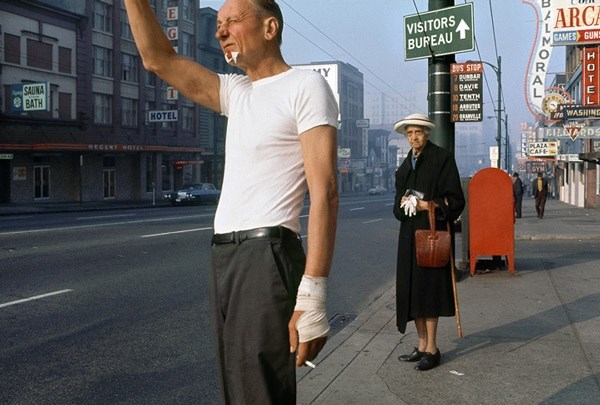
Fred Herzog, Man With Bandage 1968
image courtesy of Equinox Gallery
Returning for a second season, Snapshot: The Art of Photography II will feature Canadian photographers Fred Herzog, Lincoln Clarkes, Lana Slezic, Michael Levin, Barbara Cole and Adam Makarenko over the next six weeks. Knowledge is currently celebrating its 30th year of broadcasting quality commercial-free programming, providing "a unique mix of arts and culture programs that explore the world from provincial, national and global perspectives", while Herzog has been continually photographing the streets and the people of Vancouver since arriving here in 1953, striving to show the side of the city that wasn't represented in the tourist booklets he saw as a youth in his native Germany.
The Vancouver that Herzog found almost 60 years ago was much different than the one we know today. A much younger city, it was a bustling port whose commercial district was Hastings, its entertainment district Granville and the West End was still houses - the downtown peninsula still awaiting its first sky-scraper in the BC Electric Building in 1957. The streets of Vancouver were full of people and billboards and signage and cars, and that Herzog had the foresight to record what he experienced with colour film - more than twenty years before the art world grudgingly accepted colour photography onto the institutional walls of the gallery - was nothing short of a revelation. After all, he wasn't shooting for them anyway, and had realized that working in black-and-white would not capture the realism he was pursuing with his work. Finding a reliable colour film in Kodachrome would be a decision that would ultimately bring its own set of challenges; slide films being positive films, they cannot be used to make prints in a traditional darkroom. This would eventually change in the early years of the millennium with advances in digital photo editing software and flatbed scanners, freeing the images from the proverbial darkened room of the slide show.
Ironically enough, the first photograph by Fred Herzog I ever saw was indeed black-and-white.
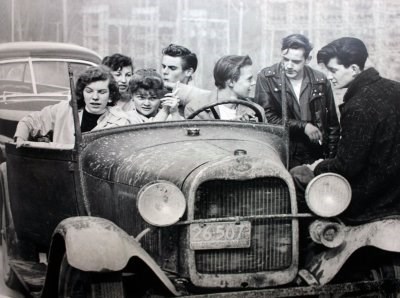
North Vancouver, 1958.
image courtesy of fredherzog.com
I arrived in Vancouver myself much later and from not nearly as far away - moving out from the suburbs to Vancouver ten years ago. I quickly developed an insatiable and incurable appetite for knowledge about my new environment, and began devouring books at an incredible pace. That I would eventually cross paths with the photography of Fred Herzog was inevitable. The image above is reprinted on the back of a great little book by Aynsley Vogel and Dana Wyse titled Vancouver: A History in Photographs (Heritage House Publishing Company Ltd, 1993), and while it is a great photograph, rich with historical and nostalgic value, it could not have prepared me for what I would see a year later.
In January of 2003 Presentation House Gallery in North Vancouver mounted an exhibition called Unfinished Business: Vancouver Street Photographs 1955 to 1985. Amongst the many fascinating photographs in that group exhibition were some astonishing colour prints from the 1950's and 60's, and there was that name again: Fred Herzog. I quickly realized that the black-and-white image on the back-cover of the book I had read the previous year was an exception and not the norm - all of his work in that particular exhibition were in colour.
By the time of Herzog's first major solo exhibition at the Vancouver Art Gallery in 2007, I was well aware of what a special body of work he had created. Along with that exhibition of more than 100 prints was the handsome companion book Vancouver Photographs (Douglas & McIntyre) featuring essays by Herzog, Grant Arnold and Michael Turner, and his work was finding an entirely new and highly receptive audience.
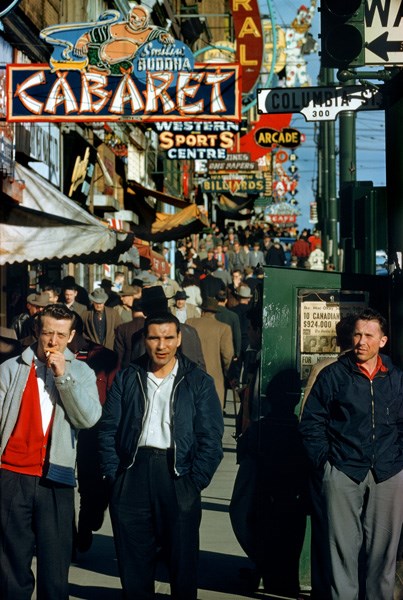
Hastings at Columbia (1958)
image courtesy of Equinox Gallery
Herzog has been an incredibly busy and in-demand person ever since, having had solo exhibitions in such places as Vancouver (Equinox Gallery), New York, Paris and Berlin - not to mention numerous group exhibitions, with more books and exhibition catalogues being published along the way. Last year, as part of their Vancouver 125 series, Knowledge featured him in a segment on local artists working in a variety of genres, sowing the seeds for this week's full episode. This also coincides with another book from Douglas and MacIntyre, and it might just be the most robust volume yet featuring 170 plates and text from Claudia Gochmann, Sarah Milroy, Jeff Wall and Douglas Coupland (for more info about this book, you can read Bob Kronbaeur's in-depth review here).
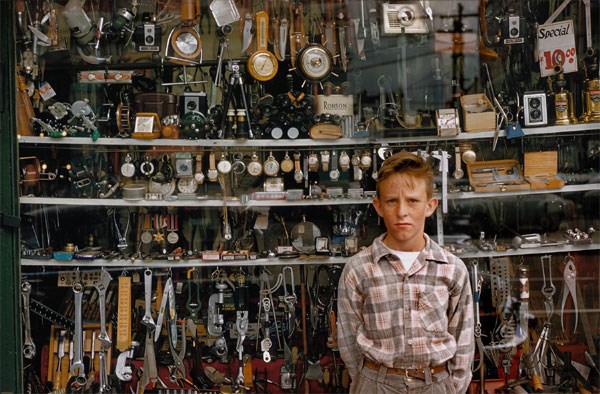 2nd Hand Store Boy, 1959
2nd Hand Store Boy, 1959
image courtesy of Equinox Gallery
I had the pleasure of attending the advance screening of the Knowledge program, and was suitably impressed with the evening's events. In addition to the viewing itself, several notable speakers discussed his body of work, each having selected a key image as inspiration: Rudy Buttignol, President and CEO of Knowledge envisioned his own young parents as the subjects of Untitled, Granville 1960, themselves having transitioned to a new life in a new country, while Douglas Coupland thanked Herzog for tirelessly and skillfully documenting the city with only a pure artistic motivation, as opposed to the pursuit of fame and fortune while discussing Granville Street from Granville Bridge 1966. Gary Stephen Ross of Vancouver Magazine had perhaps the best line early in the evening after proclaiming that the image Two Boys 1960 was a photograph of himself and his brother. "Not literally, of course," he explained, but only after a collective gasp of revelation from the audience, "but figuratively." Andy Sylvester of Equinox Gallery used Paris Cafe 1959 as a vehicle to link Herzog with Walker Evans and Robert Frank as three photographers who each sought a "symbolic truth" while feeling a certain empathy with their subjects. That last notion was echoed later by Shelagh Rogers (the voice of Knowledge) who contextualized Awake 1966 and observed that Herzog always afforded his subjects the dignity that they deserved. Former mayor of Vancouver Sam Sullivan marveled at how West End from Burrard Bridge 1957 was akin to "taking a picture of a bomb seconds before it explodes" - the neighbourhood in question about to experience "revolutionary change" in the construction of 250 residential towers in the subsequent fifteen years.
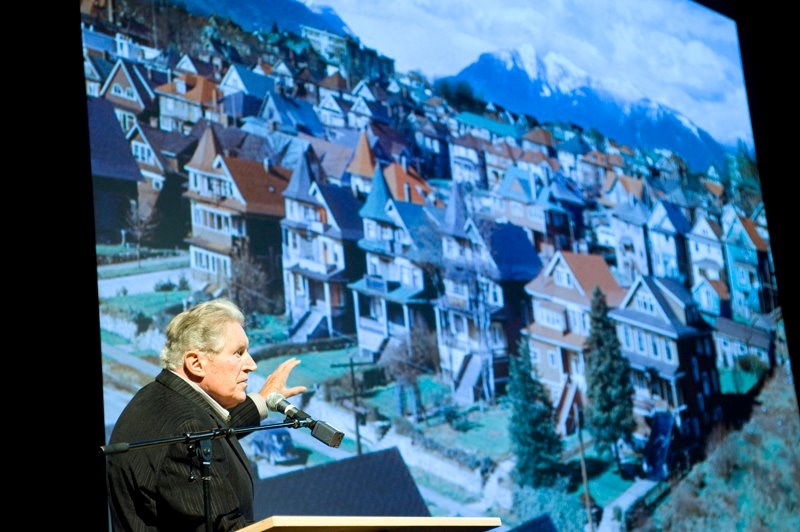 Fred Herzog gestures towards projection of his photograph West End from Burrard Bridge (1957).
Fred Herzog gestures towards projection of his photograph West End from Burrard Bridge (1957).
photograph by Jason Evans courtesy of Knowledge Network
Introduced by Rudy Buttignol as "a man who took decades to become an overnight sensation", Herzog was a treat to listen to. Now in his 81st year, the man's passion for photography was clearly evident - his insight had the crowd hanging off his every word, while his sharp wit, quick mind and priceless anecdotes had them in stitches. For example, he claims he never had the nerve to have eaten at the aforementioned Paris Cafe; not that his standards were particularly high, but that his standards weren't particularly low, either. Upon gesturing to the photograph above (the same photograph referenced by Sam Sullivan), Herzog informed the crowd that he lived for a time at 1040 Harwood Street, the street behind that first row of houses, a few of which miraculously exist to this day. A neighbour of his at the time was planning on moving to the Galápagos Islands to live off the land for the rest of his life. Part of this gentleman's self-designed training regimen was to carry a backpack full of bricks everywhere, this training continuing for many months as a way to build the necessary strength and endurance. Ultimately the neighbour never went to the Galápagos, explained Herzog. "He never did go, he never left. But he sure was fit by the end of it."
For more insight and wit from a man who has created an immense photographic body of work capturing the way Vancouver truly looked over the course of 50+ years, Snapshot: The Art of Photography II airs tonight at 10pm on Knowledge.


